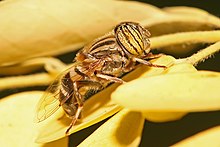
Hoverflies, also called flower flies or syrphids, make up the insect family Syrphidae. As their common name suggests, they are often seen hovering or nectaring at flowers; the adults of many species feed mainly on nectar and pollen, while the larvae (maggots) eat a wide range of foods. In some species, the larvae are saprotrophs, eating decaying plant and animal matter in the soil or in ponds and streams. In other species, the larvae are insectivores and prey on aphids, thrips, and other plant-sucking insects.

Episyrphus balteatus, sometimes called the marmalade hoverfly, is a relatively small hoverfly (9–12 mm) of the Syrphidae family, widespread throughout the Palaearctic region, which covers Europe, North Asia, and North Africa. It is considered the most abundant native hoverfly in Central Europe.

Eristalinus taeniops is a species of hoverfly, also known as the band-eyed drone fly.

Myathropa florea, sometimes referred to as the Batman hoverfly, is a very common European and North African species of hoverfly. Adults may be seen on flowers from May to September. It is of a similar size to the common drone fly, but Myathropa are generally more yellow, with two light bands to the thorax, interrupted with a black central smudge. In museum specimens, any yellow colour soon fades to brown after death. Like most species in the tribe Eristalini, Myathropa are rather variable in size, shape and colour.

Eristalinus is a genus of hoverfly. Most species have very distinctive eye marking in the form of spots or banding, though these features may fade on some preserved specimens. Most are stout flies, and are nimble flyers, even compared to other hoverfly species.
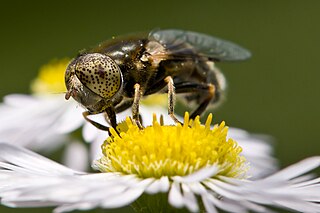
Eristalinus aeneus, the common lagoon fly, is a fairly common species of syrphid fly observed throughout the United States and Europe. Hoverflies can remain nearly motionless in flight. The adults are also known as flower flies for they are commonly found on flowers, from which they get both energy-giving nectar and protein-rich pollen. The larvae occurs along shorelines in rock pools containing large amounts of decaying seaweed.
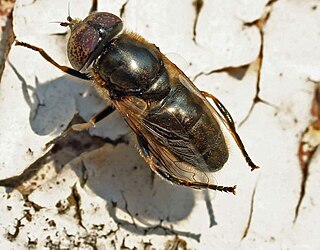
Eristalinus sepulchralis is a European species of hoverfly. The species are brownish-white from a close up, and look like a wasp. From a distance though, they are yellowish-black coloured, and look like a bumble bee. The species can be found throughout Europe in the Baltic states, North Europe, Central, Southern and Western Europe and across the Palaearctic to Kamchatka, Japan, China and India. Finland, Great Britain, Hungary, Ireland, Norway, and the Netherlands.

NOTE: Commons links to Eristalinus quinquestriatus
Eristalinus quinquelineatus is an African, European and Asian species of hoverfly.
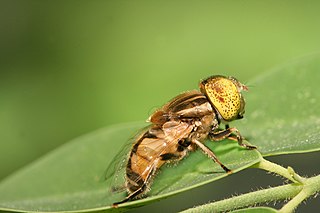
Eristalinus megacephalus is a species of hoverfly.

Neoascia is a genus of small black and yellow or mostly black flies with a narrow abdomen near the thorax. They occur mainly in damp places among low herbage. The larva of Neosascia are flattened without oral hooks and a have a short posterior spiracular process or "tail" rat-tailed that is saprophagous. In 1925 Curran reviewed the genus Neoascia. In this work a key is provided and ten species are described including four new species some of which have later been determined to be synonyms.
Austalis is a genus of Hoverflies, from the family Syrphidae, in the order Diptera.
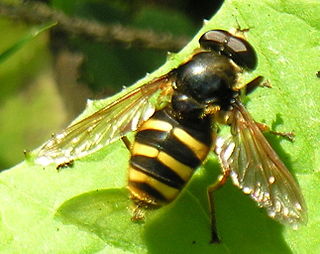
Sercomyia are large flies with species that are bee mimics both short pile and long pile. Sericomyiine flower flies are common in boreal forests across the Holarctic region and southward at higher elevations into the Oriental and Neotropical regions. Sericomyia species have larvae of the rat-tailed maggot type, often found in ponds rich in decomposing vegetation where they filter out microorganisms as their food
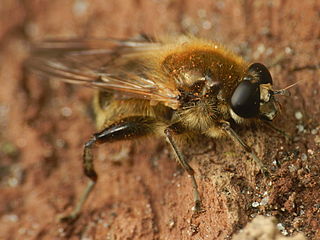
Brachypalpus is a genus of hoverflies, from the family Syrphidae, in the order Diptera. The head is triangular and produced well forwards and somewhat downwards. The thorax and abdomen with pile often rather long. The hind femur is swollen and with an obtuse spur apically and ventrally. The hind trochanters of male is spurred.
The larvae are of the rat-tailed type feeding on decaying sap under tree bark. Larvae live in decaying trees and logs. Larva and pupa have been described by Malloch.

The Brachyopini is a tribe of hoverflies. Unlike many members of this family these flies are generally darker and less colourful though some genera contain species with an attractive metallic lustre e.g. Chrysogaster. Some like Brachyopa are associated with sap runs where their larvae feed on decaying sap. Others are found in boggy areas where their often semiaquatic larvae feed on decaying organic matter.
Eristalinus barclayi is a species of African hoverfly found in Malawi. At 15 millimetres (0.59 in) long it is a fairly large hoverfly species. It resembles the widespread Eristalinus taeniops in its striped eyes but differs in having a strongly marked striped thorax.
Eristalinus seychellarum is a species of hoverfly found in the Seychelles. It is black with blue reflections and red and orange striped eyes.

Eristalinus tabanoides is a species of hoverfly that inhabits the Old world.

The Spheginina is a subtribe of hoverflies.

Eristalinus punctulatus is a species of hover fly within the genus Eristalinus, which is in the family Syrphidae.
